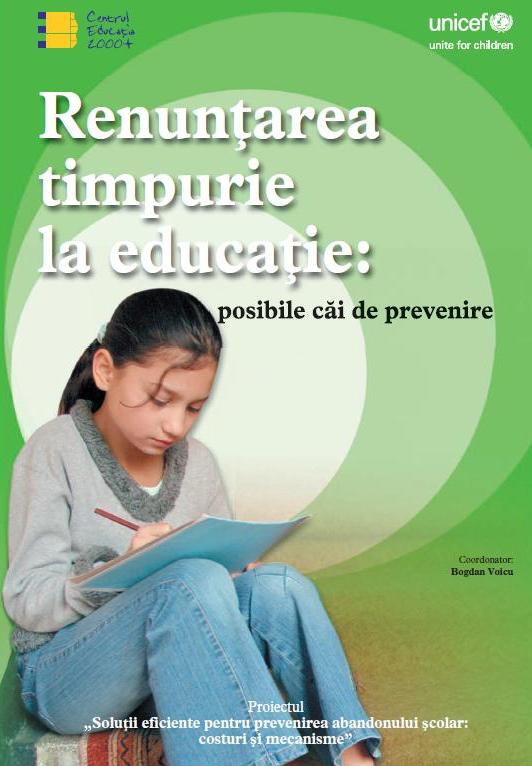Database of Publications


Early School Leaving: Possible Ways of Prevention
Coord. Bogdan Voicu
Vanemonde (ISBN 978-973-1733-15-9)
2010
Report
Romanian
English
„School dropout respresents a problem of the Romanian education system which is insufficiently dealt with, a serious problem which must be urgently turned into an immediate intervention strategy. There is no need of scientific term definitions, comparisons with more fortunate countries, didactic arguments in order to justify this need of action. There is no doubt that it is a phenomenon which – due to its significant consequences and its alarming dimensions – must be one of the top priorities of the decision makers, practicians and beneficiaries from the educational system”.
The project „Efficient Solutions of School Dropout Prevention: Costs and Mechanisms” developed by the centre Educația 2000+ and UNICEF, attempts to offer an actual support – obviously limited by necessities – for the reinforcement of the general efforts for approaching this problem.
Contents:
Facing School Dropping Out : an Emergency, a Project, a Need for Action
I. About the Necessity for the Project
II. A Short Overview of the Early School Leaving
II.1. What Brings and Keeps Students at School
II.2. What makes students quit school? Why do they drop out school?
III. By way of conclusion: between the „lost school” and „set-back school”
Objectives, methodology and main conclusions
I. Introduction
II. Background
III. Method
III.1. General assumptions on the causes of early school leaving
III.2. Data Collection
III.3. Project Team
IV. School Dropout Examples
IV.1. Repeated Grade Retention
IV.2. Disorganised Families
IV.3. Becoming or not a Ninth Grader
IV.4. Circulatory Migration
IV.5. School Active Involvement
V. School Dropout Causes: An Overview
V.1. Students and Family
V.2. Community
V.3. School
VI. Recommendations for Lines of Action
VII. References List
Case Studies – Schools
I. Description of the Locality
I.1. Location and History
I.2. Occupations, Employees
I.3. Infrastructure, Public Utilities, Transportation and Communication
I.4. Development Perspectives
II. School Description
II.1. Dimension, History, Problems, Perspectives
II.2. Representations upon the school problems
II.3. School – Community Relationship
III. Dreams and Expectations – School Education
IV. Early School Leaving
IV.1. Students and School Graduates Educational Path
IV.2. Profile of Students who Drop out School
IV.3. Reasons for Leaving the Educational System
The report worked out during the above mentioned project outlines an impressive picture of significations and aspects related to the school dropout phenomenon as a result of the empirical research data analysis.
The wide range of information provided requires a considerable amount of effort for understanding and linking together data, then for transferring them into action.
Describing several elements of this picture does not necessarily answer to a temptation for synthesizing – which has been sufficiently developed throughout the analysis by the research coordinator – but it represents a subjective clipping, intentionally left in-completed, meant to stir careful and patient analysis of the richness of significations collected in the report. Accordingly, understanding the research findings is to be carried out through this kind of lens, a subjective one released from the restraint of the rigor and accuracy required by the research.
Andreea Cleminte
Fundatia EuroEd
partner
Zone d'identification

4 mars 2013
Lancement du Module 5 “Soutien externe et coopération”
Au cours du mois de mars 2013, les partenaires forment les enseignants impliqués dans le projet au Module 5 "Soutien externe et coopération". Le module examine les ressources et soutiens externes pour les enseignants et élèves pour les aider à prévenir le décrochage scolaire.

School Inclusion - Copyright 2008 - Ce projet a bénéficié du soutien financié de la Commission européenne